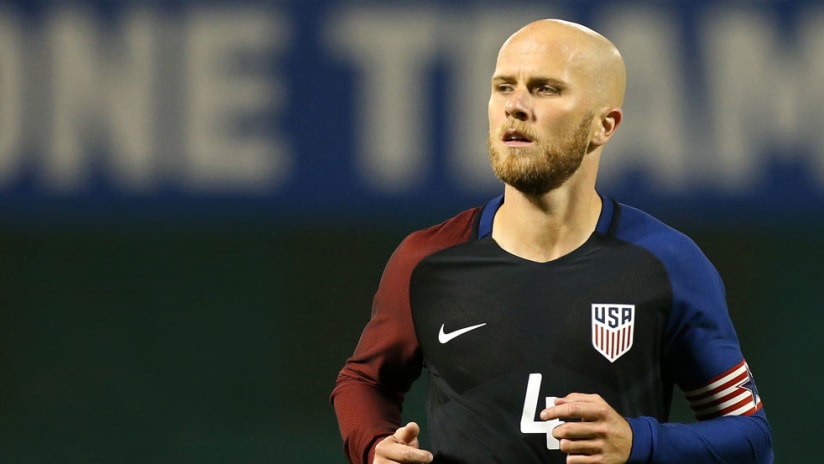SAN JOSE, Calif. – US national team midfielder Michael Bradley and his teammates have had 127 days to marinate in the ugly feeling of a 4-0 shellacking delivered by Costa Rica – a World Cup qualifying defeat so horrid it ultimately led to the dismissal of American coach Jurgen Klinsmann.
Yet the US captain knows it would only take 90 good minutes against Honduras 1543931659" tabindex="0">on Friday(10:30 pm ET | FS1, UniMás, UDN, Follow on the MLS App) to help wipe away those memories.
“There’s no two ways about it – we let ourselves down in Costa Rica,” Bradley told reporters on Tuesday after the US finished training at Avaya Stadium. “We didn’t play well enough. Mistakes turned into bigger mistakes, which turned into bigger mistakes. ... We are where we are, and now it’s about 1543931660" tabindex="0">on Friday night beginning this process of moving ourselves back up the table – stepping on the field from the first minute and playing in a really, really aggressive way that ultimately leaves no doubt as to who’s stepping off the field the winner.”
This may not be the most trying time in Bradley’s tenure with the USMNT, but if not, it has to rank near the top. The US, which also dropped a 2-1 decision to Mexico in Columbus on 1543931661" tabindex="0">Nov. 11, had never previously lost both of their first two games in the Hex. Going into 1543931662" tabindex="0">Friday, they sit dead last, trailing even Trinidad & Tobago on goal differential, as coach Bruce Arena makes his competitive debut in his second stint leading the national team.
The situation “means that our margin for error is now very, very small,” Bradley acknowledged. “But nothing’s changed in that we still feel good about the team that we have, the group that we are. I think Bruce has come in and done an excellent job in terms of re-establishing certain things and getting at a few things. I think the mentality and the spirit in training and around the group – both in January and now this week – has been excellent. So we’re excited about the chance to step on the field in a big-time qualifier.”
Bradley wouldn’t specifically identify what things were re-established by Arena, who first coached the US from 1998 to 2006, but he made it sound like the back-to-the-future regime went back to the basics, as well.
“Just across the board, we feel like we let some different things slip,” Bradley said. “He’s come in and found the right way to work and talk and show some things and make sure we understand who we are and what we’re about – [to] ultimately where we’re stepping on the field giving ourselves the best chance to win.”
Bradley is expected to be the metronome as the US attempts to pry open a Honduras defense which has shown a propensity to pack in bodies to interdict passing lanes. So how do you unlock, say, a five-man back line?
“It’s a lot of different things,” Bradley said. “Certainly, patience is important. You understand that when you play against a team that has a lot of different guys behind the ball and lines are tight, the understanding that things aren’t going to come easy, there’s not going to be tons of space. It’s not going to be, I wouldn’t think, a wide-open game. We’ve worked on a few different things in terms of how we would like to go about things so that we can put them on their heels a little bit and be dangerous, tilt the ball in our favor.”
But game-planning will only take a team so far. And after the whistle, it’s up to Bradley and Co. to ensure that a face-plant like the one they endured some four months ago doesn’t get repeated.
“To win a big game, you need six, seven, eight guys to play really well, to play real good games,” Bradley said. “And then you need the others to be good and solid. If all of a sudden you don’t get enough guys playing good games and now the others are not good, that’s the recipe for losing a game like we did in Costa Rica. It’s not complicated. We need guys to step on the field and understand the moment, not be fazed by it and go for it in a fearless way."













